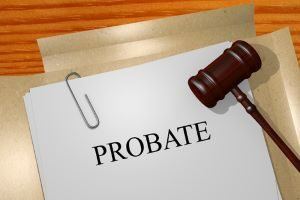
Probate court is a court that deals with the administration of a person’s estate. In New York, probate cases take place in the “Surrogate’s Court” in the county where a person was living at the time he or she died. If the deceased made a will, the will is presented to the court in a probate proceeding after his or her death. In a probate proceeding, the named executor in the will files a petition in Surrogate’s Court. In New York, probating a will allows the executor to access a deceased individual’s assets, distribute the estate to any heirs, and settle any outstanding debts.
STEPS IN THE PROBATE PROCESS
Only an estate with a value of more than $30,000 has to be probated if there is a will. Any estate that does not have a will is “administered,” not probated. Certain assets, such as retirement plans (401K or IRA) and additional accounts with a beneficiary, are not part of the probate process. During the probate process, the executor is issued “Letters Testamentary,” which is documentation giving the legal right to perform the duties as an executor. Here are several steps followed when completing the probate process:
1. Obtain a certified copy of the death certificate for the deceased person. Visit the New York State Department of Health website if you need more information.
2. Find the original will if you do not already have it. You may have to search the deceased’s home to find it.
3. Locate the New York State Surrogate’s Court with jurisdiction over the county where the deceased person lived. Visit the official website of the New York State Unified Court System.
4. Visit the clerk’s office of the Surrogate Court. Make sure you have the will, the death certificate, and your state ID or driver’s license. If you do not have a copy of the will, the clerk can search for it as long as it was filed there.
5. Write down the deceased’s assets, including any real estate, vehicles, bank accounts, etc. Assign a value to each and add them together. The total is the “approximate estate value.”
6. Fill out the entire probate petition form. Typically, this requires the name and address of the executor, the deceased person’s name, and any beneficiaries/heirs according to the will. It should also include the date of death, the approximate estate value, and the deceased’s citizenship.
7. Fill out the Waivers of Service; Consent to Probate forms. Each heir must sign and date the appropriate waiver.
8. Have any witnesses sign affidavits; these confirm the witnesses were present when the deceased individual signed the will. Affidavits may not be necessary if the deceased filed his or her will in the Surrogate’s Court before his or her death.
9. Pay the filing fee for the petition and for any additional waiver and affidavit. Add the total together. Make out a check or money order in the amount of the total owed to the court.
10. File the Petition for Probate, Waivers of Service; Consent to Probate form, the death certificate, witnesses affidavits, and the original will (unless already filed) in the Surrogate’s Court.
CONTACT A NEW YORK CITY PROBATE AND ESTATE PLANNING LAWYER
Although you may have heard the term “probate” before, it is important to understand the process if you have been named the executor of an estate. Preparing for these legal proceedings can help you take the guesswork out of what to do with a family member’s estate when he or she dies.
Written by Marcel Sager, an experienced New York Elder Law and Estate Planning Attorney and the founder of Goldberg Sager & Associates in Brooklyn, New York. Attorney Sager is a Featured Member of the National ElderCare Matters Alliance, and he and his law firm are listed on ElderCareMatters.com – America’s National Directory of Elder Care / Senior Care Resources to help families plan for and deal with the Issues of Aging.
If you have additional questions about your family’s Elder Care / Senior Care Matters, you can count on ElderCareMatters.com (America’s National Directory of Elder Care / Senior Care Resources) to help you find America’s Top Elder Care / Senior Care Professionals. You can find Local Elder Care / Senior Care Experts by Searching our National Database by City and Service Category. (This Search feature is located on the homepage of ElderCareMatters.com).
The Elder Care / Senior Care Experts that are found on ElderCareMatters.com can provide you with the help you need in a total of 54 different Elder Care / Senior Care Services, including Elder Law, Estate Planning, Home Health, Assisted Living, Care Management, Daily Money Management, Senior Living, Investment Advisory Services, Tax & Accounting Services, Wills & Trusts, Probate plus many other Elder Care Services.
We look forward to helping you plan for and deal with your family’s Issues of Aging.



